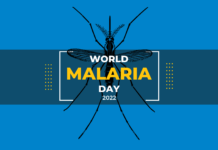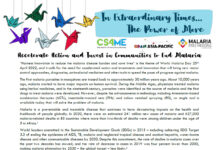A strong partnership and committed efforts of the national malaria programs, the civil society organizations, development partners, and malaria-affected communities is key for the GMS countries to reach the malaria elimination goal by 2030. The well-established service delivery in the community help reduce the malaria burden and pave the way towards malaria elimination in countries. Undoubtedly, the Civil Society Organizations (CSOs) have been playing a crucial role in malaria control and elimination in the GMS, reaching the remote and vulnerable populations with malaria services. However, the new emergence of COVID-19 is threatening the progressive achievement of malaria elimination on an unprecedented scale. Uninterrupted malaria services delivery and uptake during the pandemic require the strategic thinking of implementing malaria prevention and case management and surveillance activity.
APMEN XChange is a virtual sharing and learning platform initiated by APMEN to advance malaria elimination dialogue in the Asia Pacific Region. With very much aligned mission, APMEN and Malaria CSO Platform, GMS co-hosted APMENxChange webinar titled ‘New challenges, Existing networks: Civil Society experiences in the GMS during COVID-19’. The panelists involved community health experts, health systems experts, and global health advocates; Mr. Louis Da Gama, Dr. Hnin Su Su Khin, Dr. Eisa Hamid, and Mr. Shreehari Acharya, shared the current CSO practices in the field amidst COVID and strategies to go beyond malaria through building trust within the communities, use of available relevant communication technology and tools and health system strengthening in countries.
- Build trust with beneficiaries.
Mr. Shreehari Acharya outlined that the limited knowledge of COVID-19, limited personal protective equipment to community health workers, travel restrictions, and the apprehension of contracting COVID-19 from the strangers, especially those who return from COVID-19 burden areas were the main drivers to disrupt the service delivery in the community. To blend in within the community, Mr. Louis Da Gama pointed out improving trust is crucial by addressing social, cultural, and language barriers. Establishing a deep root of trust of CSOs within the community proves useful when Dr. Hnin Su Su Khin from Medical Action Myanmar (MAM) shared the organization’s implementation in very high malaria burden villages amidst of COVID-19 situation. MAM was able to provide door-to-door testing and behavior change through inter-personal communication in the malaria hot spot villages despite the growing anxiety of COVID-19 in the community. As Dr. Hnin Su Su Khin mentioned: “CSOs are no stranger to the communities. We live and provide health services among the communities. The communities accept us as one of their own. Thus, we can continue the services needed by the community even in the pandemic situation”. Dr. Eisa Hamid supported that adjusting the implementation strategies building upon the trust relationship between CSOs and the community should be applied to other GMS countries.
2. Integration of health services is never too late to start – Get it done
Mr. Louis Da Gama emphasized CSOs in the countries are complementing the national effort to provide health services to cover the whole population. In fact, having a variety of healthcare cadre such as GPs, pharmacies, village malaria workers, health volunteers widely cast the service nets to all vulnerable and at-risk populations no matter how remote they are. Based on the existing mutual trust and relationships within the communities, CSOs can continue to adapt the strategies and adjust the health services delivery to the community. The gains in flattening malaria curve in the GMS region is a successful model of the national programs, donors, and CSOs together with multiple partners, working synergistically. As Mr. Louis Da Gama observed that there is an urge for the programs to adapt the strategies to integrate community-relevant diseases on top of malaria services. Integrating services mean malaria volunteers who once provides a much-focused package of malaria services transformed into a comprehensive community health service providers to achieve Universal Health Coverage for the population. As an example of the integration of service delivery in Myanmar, CSOs are delivering health messages with loudspeakers for both malaria and COVID-19 messages, helping fever screening at gates assisting the township health department for referral, assisting the basic health staff at the immunization event. Besides, without the righteous model of integration service, malaria elimination and universal health coverage can be difficult to reach.
3. Leverage the strength of Civil Society Organizations (CSOs) in the transition to sustainability.
Notably, countries are putting efforts to build resilient health systems, improving health service delivery, supply chain, workforce, information systems, financing, and leadership. In order to maximize the effort, countries need to understand improved responsiveness to the community needs, social and financial risk protection and improved efficiency while designing and implementing health services. The structural and functional gaps in the health system become more prominent when the countries endure emergent COVID-19 response. Leveraging the strength of all relevant stakeholders can extremely helpful easing strains of the health system, more importantly, the workload burden of health workers at the frontline. Dr. Esia Hamid acknowledged that CSOs could be relied upon as a true partner in delivering malaria and other health services with extension to the underserved populations, improving the gaps of essential health services, and reducing the financial burden of the health system. At the same time, health service integration, knowledge transferring, and upgrading community capacity, disease surveillance strengthening together with relevant stakeholders including CSOs, will be the cornerstone in the transition to a more sustainable health system.







